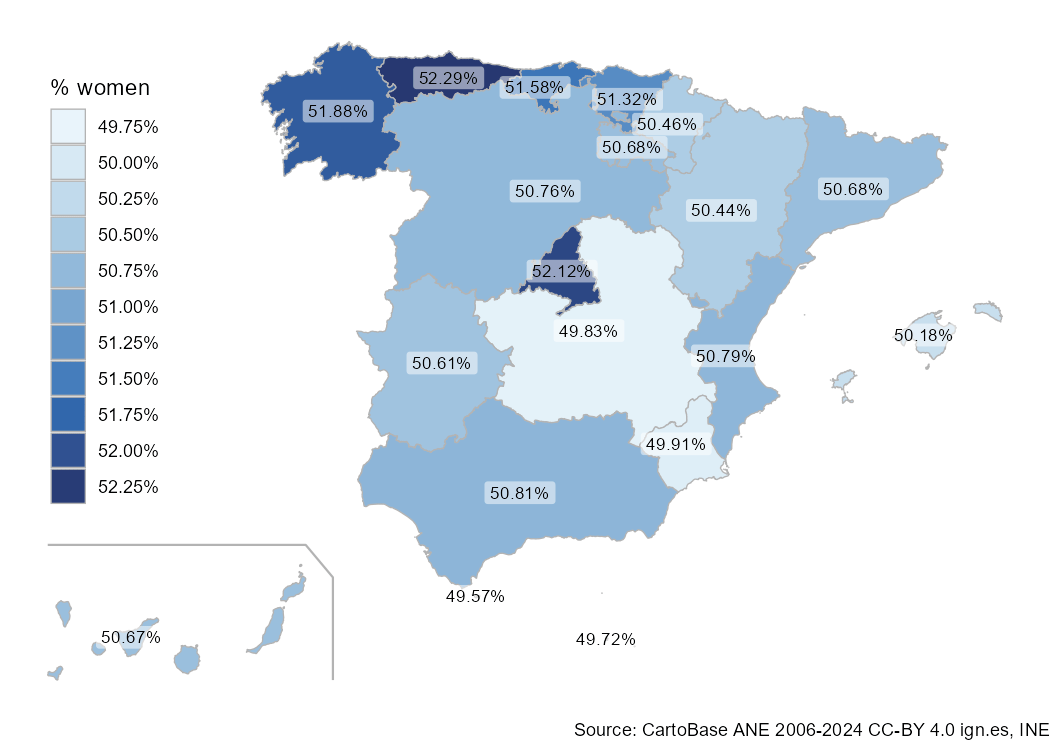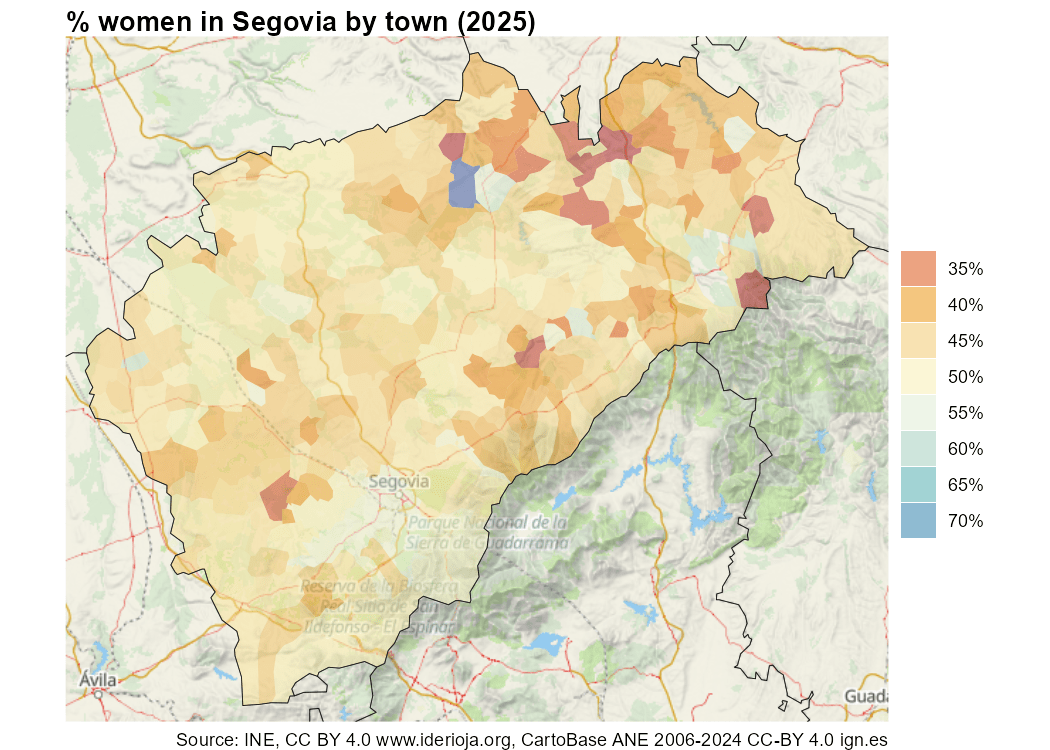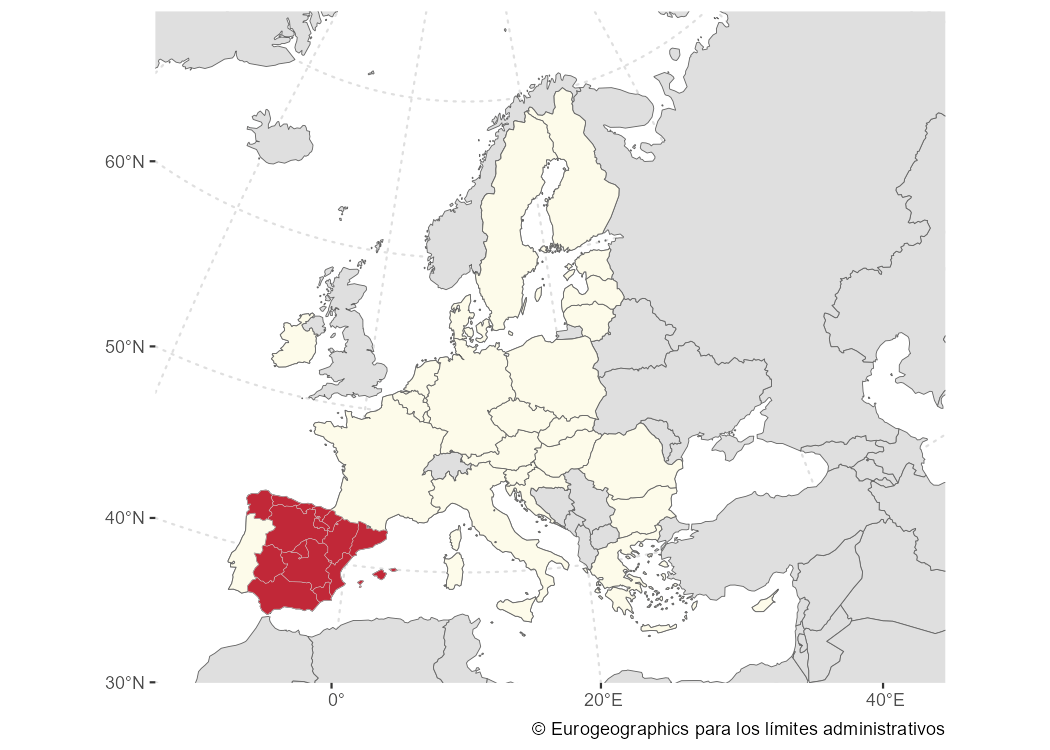
The hardware and bandwidth for this mirror is donated by METANET, the Webhosting and Full Service-Cloud Provider.
If you wish to report a bug, or if you are interested in having us mirror your free-software or open-source project, please feel free to contact us at mirror[@]metanet.ch.

mapSpain is a package that provides spatial sf objects of Spain’s administrative boundaries, including Autonomous Communities, provinces, and municipalities.
mapSpain also provides a Leaflet plugin to be used with the leaflet package, which loads several base maps from Spain’s public institutions and enables downloading and processing of static tiles.
Full site with examples and vignettes on https://ropenspain.github.io/mapSpain/
Install mapSpain from CRAN:
install.packages("mapSpain", dependencies = TRUE)You can install the developing version of mapSpain using the r-universe:
# Install mapSpain in R:
install.packages("mapSpain",
repos = c(
"https://ropenspain.r-universe.dev",
"https://cloud.r-project.org"
),
dependencies = TRUE
)Alternatively, you can install the developing version of mapSpain with:
# install.packages("pak")
pak::pak("rOpenSpain/mapSpain", dependencies = TRUE)This script highlights some features of mapSpain : key features of mapSpain
library(mapSpain)
library(sf)
library(dplyr)
census <- mapSpain::pobmun25 |>
select(-name)
# Extract CCAA from base dataset
codelist <- mapSpain::esp_codelist |>
select(cpro, codauto) |>
distinct()
census_ccaa <- census |>
left_join(codelist) |>
# Summarize by CCAA
group_by(codauto) |>
summarise(pob25 = sum(pob25), men = sum(men), women = sum(women)) |>
mutate(
porc_women = women / pob25,
porc_women_lab = paste0(round(100 * porc_women, 2), "%")
)
# Merge into spatial data
ccaa_sf <- esp_get_ccaa() |>
left_join(census_ccaa)
can <- esp_get_can_box()
# Plot with ggplot
library(ggplot2)
ggplot(ccaa_sf) +
geom_sf(aes(fill = porc_women), color = "grey70", linewidth = .3) +
geom_sf(data = can, color = "grey70") +
geom_sf_label(aes(label = porc_women_lab),
fill = "white", alpha = 0.5,
size = 3, linewidth = 0
) +
scale_fill_gradientn(
colors = hcl.colors(10, "Blues", rev = TRUE),
n.breaks = 10, labels = scales::label_percent(),
guide = guide_legend(title = "% women", position = "inside")
) +
theme_void() +
theme(legend.position.inside = c(0.1, 0.6)) +
labs(caption = "Source: CartoBase ANE 2006-2024 CC-BY 4.0 ign.es, INE")
You can combine sf objects with static tiles
# Get census
census <- mapSpain::pobmun25 |>
mutate(porc_women = women / pob25) |>
select(cpro, cmun, porc_women)
# Get shapes
shape <- esp_get_munic_siane(region = "Segovia", epsg = 3857)
provs <- esp_get_prov_siane(epsg = 3857)
shape_pop <- shape |> left_join(census)
tile <- esp_get_tiles(shape_pop, type = "IDErioja.Relieve", zoommin = 1)
# Plot
library(ggplot2)
library(tidyterra)
lims <- as.vector(terra::ext(tile))
ggplot(remove_missing(shape_pop, na.rm = TRUE)) +
geom_spatraster_rgb(data = tile, maxcell = 10e6) +
geom_sf(aes(fill = porc_women), color = NA) +
geom_sf(data = provs, fill = NA) +
scale_fill_gradientn(
colours = hcl.colors(10, "RdYlBu", alpha = .5),
n.breaks = 8,
labels = function(x) {
sprintf("%1.0f%%", 100 * x)
},
guide = guide_legend(title = "", )
) +
coord_sf(
xlim = lims[c(1, 2)],
ylim = lims[c(3, 4)],
expand = FALSE
) +
labs(
title = "% women in Segovia by town (2025)",
caption = paste0(
"Source: INE, CC BY 4.0 www.iderioja.org, ",
"CartoBase ANE 2006-2024 CC-BY 4.0 ign.es"
)
) +
theme_void() +
theme(
title = element_text(face = "bold")
)
If you need to plot Spain alongside other countries, consider using the giscoR package, which is installed as a dependency with mapSpain. Here’s a basic example:
library(giscoR)
# Set the same resolution for a perfect fit
res <- "20"
all_countries <- gisco_get_countries(resolution = res) |>
st_transform(3035)
eu_countries <- gisco_get_countries(resolution = res, region = "EU") |>
st_transform(3035)
ccaa <- esp_get_ccaa(moveCAN = FALSE, resolution = res) |>
st_transform(3035)
library(ggplot2)
ggplot(all_countries) +
geom_sf(fill = "#DFDFDF", color = "#656565") +
geom_sf(data = eu_countries, fill = "#FDFBEA", color = "#656565") +
geom_sf(data = ccaa, fill = "#C12838", color = "grey80", linewidth = .1) +
# Center in Europe: EPSG 3035
coord_sf(xlim = c(2377294, 7453440), ylim = c(1313597, 5628510)) +
theme(
panel.background = element_blank(),
panel.grid = element_line(colour = "#DFDFDF", linetype = "dotted")
) +
labs(caption = giscoR::gisco_attributions("es"))
Some data sets and tiles may have a size larger than 50MB. You can use mapSpain to create your own local repository at a given local directory passing the following option:
esp_set_cache_dir("./path/to/location")When this option is set, mapSpain will look for the cached file and load it, which speeds up the process.
Hernangómez D (2026). mapSpain: Administrative Boundaries of Spain. doi:10.5281/zenodo.5366622, https://ropenspain.github.io/mapSpain/.
A BibTeX entry for LaTeX users is:
@Manual{R-mapspain,
title = {{mapSpain}: Administrative Boundaries of Spain},
year = {2026},
version = {1.0.0},
author = {Diego Hernangómez},
doi = {10.5281/zenodo.5366622},
url = {https://ropenspain.github.io/mapSpain/},
abstract = {Administrative Boundaries of Spain at several levels (Autonomous Communities, Provinces, Municipalities) based on the GISCO Eurostat database <https://ec.europa.eu/eurostat/web/gisco> and CartoBase SIANE from Instituto Geografico Nacional <https://www.ign.es/>. It also provides a leaflet plugin and the ability of downloading and processing static tiles.},
}Check the GitHub page for source code.
This package uses data from CartoBase SIANE, provided by Instituto Geográfico Nacional:
See https://github.com/rOpenSpain/mapSpain/tree/sianedata
This package also uses data from GISCO. GISCO (FAQ) is a geospatial open data repository containing multiple datasets at various resolution levels.
From GISCO > Geodata > Reference data > Administrative Units / Statistical Units
When data downloaded from this page is used in any printed or electronic publication, in addition to any other provisions applicable to the whole Eurostat website, data source will have to be acknowledged in the legend of the map and in the introductory page of the publication with the following copyright notice:
EN: © EuroGeographics for the administrative boundaries
FR: © EuroGeographics pour les limites administratives
DE: © EuroGeographics bezüglich der Verwaltungsgrenzen
For publications in languages other than English, French or German, the translation of the copyright notice in the language of the publication shall be used.
If you intend to use the data commercially, please contact EuroGeographics for information regarding their license agreements.
These binaries (installable software) and packages are in development.
They may not be fully stable and should be used with caution. We make no claims about them.